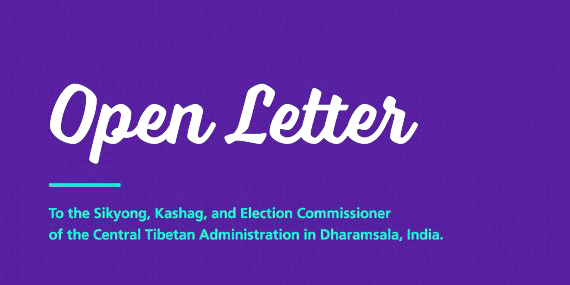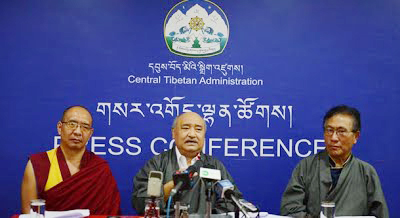New Voter Registration Open
The Election Commission has announced a fresh voter registration deadline after the successful completion of the preliminary election in October. Tibetans who have recently turned 18 years old and were too young to participate in the preliminary election can register now for the final election. The new registration opened from November 6and the deadline has been extended to February 20 next year. The EC’s announcement stressed that regional election commissioners should make sure that new voters have fulfilled the annual voluntary contribution for this year. Details of the new voter registrations should be sent to the EC by February 28 next year.
North America:Preliminary Result
The result of the preliminary election in North America for the Tibetan Prime Minister and members of the 16th Tibetan Parliament-in-exile has been released by the Office of Tibet, Washington. The North American vote countshowed a decisive win for Dr LobsangSangay with a 63.5% margin. Sangay also led the polls in India and Nepal in the preliminary election. The North American electorate comprises Tibetans living in the United States and Canada. Despite the registration of 9,803 people to vote, only 5,619 voted in the preliminary election on October 18. From this turnout, Dr LobsangSangay led with 3,558 votes, followed by Speaker PenpaTsering (1,236 votes),Lukar Jam Atsok (610 votes), TashiWangdue (191 votes) and finally TashiTopgyal (4 votes). For members of the 16th Tibetan Parliament (Chithue) candidates, North America voted for TashiTopgyal, former MP, followed by Tenzin Rangdol and Pema Chagtzoetsang respectively.
Election Procedures in the Spotlight: the EC Addresses Concerns
The new democratic system for the Tibetan Government-in-Exile, set up since His Holiness the 14th Dalai Lama’s retirement from political life, has been a source of pride for Tibetans. However, two open letters addressed to the Election Commission (EC) regarding the current Sikyong election have raised significant concerns regarding whether the democratic principles are being put into practice.
 The first letter, entitled An Open Letter to the Sikyong, Kashag, and Election Commissioner of the Central Tibetan Administration in Dharamsala, India, was co-authored by 27 European and North American pro-Tibet support organisations. It expressed concerns over the procedural transparency regarding which organisations are approved and/or exempt from election regulations, the unfair advantages available to incumbent officials, and the lack of an independent body to create and enforce regulations.
The first letter, entitled An Open Letter to the Sikyong, Kashag, and Election Commissioner of the Central Tibetan Administration in Dharamsala, India, was co-authored by 27 European and North American pro-Tibet support organisations. It expressed concerns over the procedural transparency regarding which organisations are approved and/or exempt from election regulations, the unfair advantages available to incumbent officials, and the lack of an independent body to create and enforce regulations.
This letter documented particular incidences of selective enforcement of electoral rules, stating that violations such as a candidate using an official platform for their own campaign purposes have occurred without penalty.
Another letter entitled An Open Letter to the Chief Election Commissioner Mr Sonam Choephel Shosur la was authored by Jigme Ugen on behalf of the National Tibetan Congress. This letter leveled criticism at the process by which Tibetan organisations gain approval from the Central Tibetan Administration (CTA) and the EC to nominate and publicly support candidates during the election.
In the current system there are only eleven approved Tibetan organisations that are able to nominate and publicly approve candidates. These eleven organisations are pre-approved by Parliament. Both open letters argue that the current system used by the Tibetan Parliament-in-Exile lacks transparency and hinders the right to free speech regarding political candidates for Tibetan organisations not officially recognised by the CTA.
The National Tibetan Congress, speaking as an organisation currently unrecognised by the CTA, states in its open letter that this limitation “conditions the right of free speech on official permission, and sets up a two-tier system that treats organisations differently”. The National Tibetan Congress included a public request for official recognition from the CTA in its letter.
In response to these two open letters of concern, the Electoral Commission, led by EC Chief Sonam Choephel Shosur, released a statement denying any systematic failure, rather that it had accurately followed all electoral procedures set out by the Tibetan Parliament-in-Exile. The EC’s statement drew attention to the unique context of the exiled status of the Tibetan parliament, stating that “…the rules and regulations of the Central Tibetan Administration are formulated on the basis of a refugee community, which cannot be compared to the laws of democratic independent countries.”
Sonam Choephel Shosur also noted that criticism should be directed towards official channels to be dealt with by the electoral Commission.
“Any complaint has to be backed with irrefutable evidence and proof to be taken into consideration. Besides, any complaint ought to be brought forth from a local Election Commission level where the incident of malpractice has occurred. The local EC should then approach the headquarters with the grievances.”
A delegation from three independent agencies – Asia Democracy Network, Forum-Asia, and the Asian Network for Free Elections – was sent to Dharamsala to independently observe and assess the election proceedings. This delegation has released a preliminary statement, highlighting that the “lessons learned from them [the 2015 Sikyong and Parliamentary Elections] will result in another important step towards consolidating democracy for the Tibetan Community”. The delegation will release a comprehensive report on the positive and negative aspects of the preliminary election on November 20 at Hotel Norbu House. It is hoped that this report, combined with feedback from the open letters addressed to the EC, can help to improve procedural fairness before the final round of voting on March 20 next year. The observers did give very positive feedback following the election, saying “this election saw people’s vigorous engagement in election through debates, discussions and campaign activities, which is evidence of people’s active involvement in the political process which should be encouraged and embraced”.
Keep up to date on election issues by following this link to our election news page: Election News





 Print
Print Email
Email